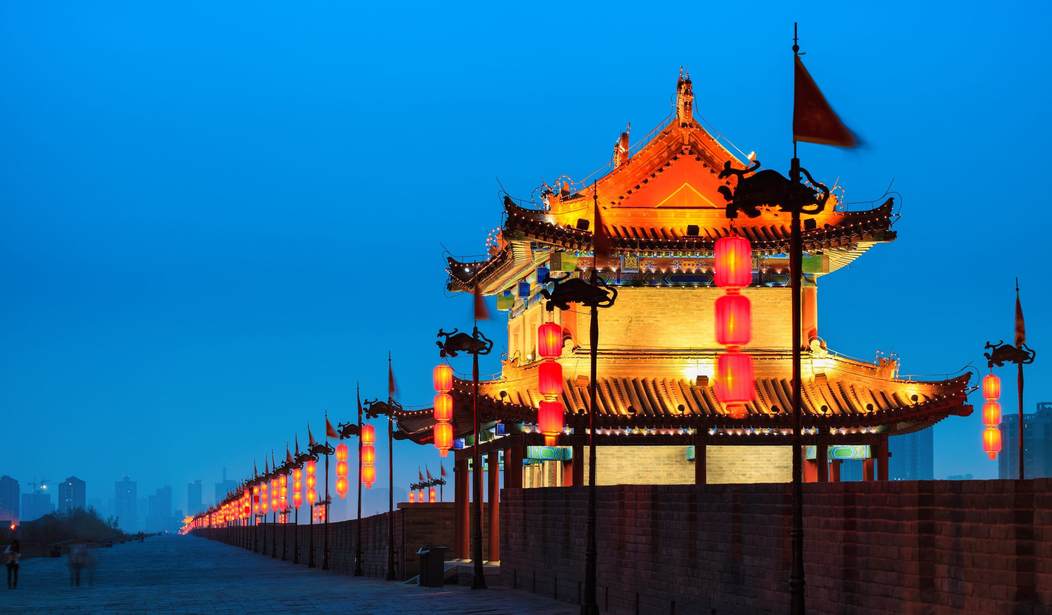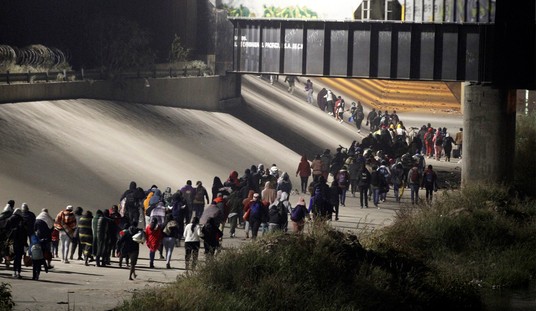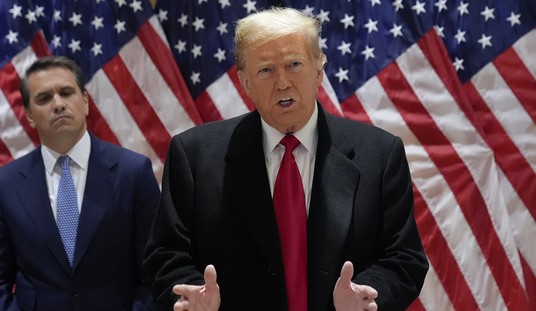While the West was busy guarding against the perils of climate change and politically incorrect attitudes, China stole a march on it by starting on their Silk Road project. “Europeans are just beginning to come to grips with the realization that China’s ‘One Belt, One Road’ may be more than just an economic opportunity. The ambitious mix of economic, infrastructure and diplomatic initiatives—paired with a maritime road from the South China Sea to the Port of Piraeus—aims to create a new “silk road” from Yiwu in central Zhejiang Province to Madrid, Spain.”
For the United States the prospect of a high capacity land logistics corridor through the Eurasian landmass means that China would be less vulnerable to maritime blockade, especially by naval forces in the Indian Ocean. It also raises the prospect of a new bipolar world, one where for the first time the US could potentially be the weaker state.
To the many impoverished countries along the planned Silk Road route — many of them Islamic — Beijing’s announcement simply means a potential windfall. “Behind China’s trillion-dollar effort to build a modern Silk Road is a lending program of unprecedented breadth, one that will help build ports, roads and rail links, but could also leave some banks and many countries with quite a hangover.” China is offering — some say giving away — money which many of these countries probably have no hope of paying but they’ll take it anyway.
At the heart of that splurge are China’s two policy lenders, China Development Bank (CDB) and Export-Import Bank of China (EXIM), which have between them already provided $200 billion in loans throughout Asia, the Middle East and even Africa.
They are due to extend at least $55 billion more, according to announcements made during a lavish two-day Belt and Road summit in Beijing, which ends on Monday. … For Laos, one of Asia’s poorest countries, the $7 billion cost for the China-Laos railway was more than half its 2015 gross domestic product. Its concessionary loan from EXIM was set below 3 percent interest.
In Pakistan, where China has pledged to invest up to $56 billion in rail, road and energy infrastructure, its debt and other repayments on Belt and Road will peak at around $5 billion in 2022, according to the Pakistan government’s chief economist.
Ding, from CDB, said loans to heavily indebted, poor countries were within the limit set by the International Monetary Fund, including interest rates and loan periods.
But borrower nations say there is also little choice as China presses its first international development push.
“It’s almost a no-brainer,” said Sima Kamil, CEO designate of Pakistan’s United Bank.
“It’s very easy to say there will be all of this debt, but if we don’t get this, where are we going to go?”
China is buying up McKinder’s World Island, the Eurasian landmass. It’s not only about trade. It’s about world power. Chinese president Xi was at pains to mollify Vladimir Putin who might otherwise be threatened by the momentous implications of such a move. Newsweek reported, “at the two-day event, Xi attempted to put to rest fears that a revived Silk Road would expand China’s influence in Europe and Asia, telling the forum, according to Reuters: ‘China is willing to share its development experience with all countries. We will not interfere in other countries’ internal affairs. We will not export our system of society and development model, and even more will not impose our views on others.'”
But there was no hiding the geopolitical challenge this represented, especially near the Horn of Africa, where both the maritime routes and the planned Silk Road cross paths. Here Eurasia directly rivals Oceania. “Increasingly, it is clear that Chinese ambitions now go far beyond just clearing a trade route. Beijing is building a naval base in Djibouti to help oversee its expanding global network. The Chinese are also shifting resources into their “gator navy”—a mix of maritime forces that could potentially be deployed to protect their sea lines of communications. Meanwhile, China continues to expand its military influence into the Indian Ocean.”
The Europeans could do no more than bleat, complaining about improper language and a “lack of transparency”, as the WSJ writes:
“European officials at the forum said the proposed trade statement omitted clauses on transparency and standards in tendering contracts, even though China had endorsed similar clean-governance language at past Group of 20 and Asia-Europe summits.
“We felt this language was going backwards” from what China had previously agreed to, said one European official, who suggested Beijing had drafted the statement to benefit Chinese companies in future Silk Road contracts. “It’s about selling their stuff,” the official said.
The official says it as if it were a bad word. Of course “selling their stuff” and expanding in Africa, Eurasia and the Middle East in terms which leave no doubt as to who is in charge is a bad word — in Europe. The West, in its dreamlike state of guilty paralysis, condemned them as “triggering” and “bigoted” leaving such things to China. Now they’ve found the tables turned on them, facing a Beijing able to talk down at them.
it’s clear that China is shifting from a remote presence to (A) a neighbor whose sidewalk extends to Europe’s front door and (B) a significant player in the global commons that Europeans previously plied without much likelihood of ever crossing paths with a Chinese frigate.
In addition, Chinese influencers are increasingly popping up across the European landscape. Confucius Institutes, an ambitious Chinese soft power initiative, have been established all over the world, in partnership with local universities. Meanwhile, Beijing’s Foreign Ministry has established cultural centers offering language and cultural programs in Europe. According to report by the China Policy Institute, Europe “hosts 7 centres with locations in Paris, Malta, Berlin, Moscow, Madrid Copenhagen and Brussels.”
What has caught the attention of most European observers, however, is China matching its cultural activities and economic influence in Europe with increasing demands for political and diplomatic influence—particularly in central Europe. “Beijing is pledging tens of billions of dollars of investment and aid and signing major cooperation agreements with everyone from the Republic of Georgia to Romania to Belarus, and in the process is gaining political influence and beginning to reshape the geopolitics of the region,” scholar Paul Coyer wrote in 2015, “This influence will come at the expense both of Russia and of the West.”
A Europe which dominated the world for centuries is facing second-rate status. How did it come to this? Perhaps the issues defined as critical by the Western elites these decades were the wrong ones. Perhaps, the Western left should not have emphasized these while the Chinese invested heavily in infrastructure and industry, planned the Silk Road, and prepared the technology to explore outer space.
If they chose poorly the time for regret is swiftly passing. As the contrast between those divergent strategies becomes ever clearer all Europe can do is wail about transparency. Europe is “uncomfortable” with developments, the WSJ writes. Do they think the Chinese will care? The biggest danger to the leftist project may prove to be not “populism” or Trumpism but irrelevance.
The hope that if only Brexit and Trump could be cleared from the road to the end of history would be open now seems false. The project had too much that was wrong with it, too much that was ignored. The Narrative, far from being the weapon of the vanguard, proved nothing but an instrument of self-delusion, a Maginot Line against reality. Its phrases are even now dwindling into the tatters of an ideology which in retrospect was patently laughable and all the more humiliating for that. The assurances that deceived a whole generation are heading for a tremendous crash.
Follow Wretchard on Twitter
For a list of books most frequently purchased by readers, visit my homepage.
Support the Belmont Club by purchasing from Amazon through the links below.
Books:
The Mattis Way of War: An Examination of Operational Art in Task Force 58 and 1st Marine Division, Author Major Michael L. Valenti examines General James N. Mattis’s staffing philosophies, the influence of history on his operational planning and execution, and his general command and leadership philosophies using Task Force 58 as a formative base. A brief look at his time commanding the 1st Marine Division in Operation Iraqi Freedom (Oif) examines whether his philosophies and concepts evolved or remained consistent.
A Crack in Creation: Gene Editing and the Unthinkable Power to Control Evolution (pre-order: to be released on June 13, 2017), by Jennifer Doudna and Samuel H. Sternberg. CRISPR is the cheapest, simplest, most effective way of manipulating DNA ever known. In this book, Doudna shares the thrilling story of her discovery, but also passionately argues that enormous responsibility comes with the ability to rewrite the code of life, an argument that echoes her call for a worldwide moratorium on the use of CRISPR in the spring of 2015. With CRISPR, she shows, we have effectively taken control of evolution. What will we do with this unfathomable power?
Swift Boats at War in Vietnam, edited by Guy Gugliotta, John Yeoman, and Neva Sullaway. The stories in this book cover the Swift Boats’ early years, which saw search-and-inspect operations in Vietnam’s coastal waters, and their later years, when the Swift Boats’ mission shifted to the Mekong Delta’s labyrinth of 3,000 miles of rivers, streams, and canals. An intimate, exciting oral history of Swift Boats at war in Vietnam.
China’s Asian Dream: Empire Building along the New Silk Road, by Tom Miller. Combining a geopolitical overview with on-the-ground reportage from a dozen countries, this book offers a fresh perspective on the rise of China and what it means for the future of Asia. From the Mekong River Basin to the Central Asian steppe, China is flexing its economic muscle for strategic ends. By setting up new regional financial institutions, it is challenging the post-World War II order established under the watchful eye of Washington, and by funding and building roads, railways, ports and power lines across Eurasia and through the South China Sea and Indian Ocean, China aims to draw its neighbors ever tighter into its embrace.
For a list of books most frequently purchased by readers, visit my homepage.
Did you know that you can purchase some of these books and pamphlets by Richard Fernandez and share them with your friends? They will receive a link in their email and it will automatically give them access to a Kindle reader on their smartphone, computer or even as a web-readable document.
The War of the Words, Understanding the crisis of the early 21st century in terms of information corruption in the financial, security and political spheres
Rebranding Christianity, or why the truth shall make you free
The Three Conjectures, reflections on terrorism and the nuclear age
Storming the Castle, why government should get small
No Way In at Amazon Kindle. Fiction. A flight into peril, flashbacks to underground action.
Storm Over the South China Sea, how China is restarting history in the Pacific
Tip Jar or Subscribe or Unsubscribe to the Belmont Club









Join the conversation as a VIP Member